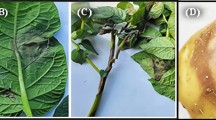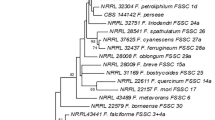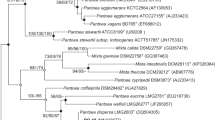Abstract
PREVIOUS studies have indicated the importance of infected seed as a source of the stem and fruit rot disease of tomatoes caused by Didymella lycopersici Kleb. Hickman1 reported 25–34 per cent infection of an outdoor crop grown from seed, a proportion of which was infected. Schoevers2 demonstrated the presence of mycelium and pycnidia of the fungus on the seed coat and radicle of germinating seed, and Ogilvie3 observed the fungus on the cotyledons and hypocotyl of tomato seedlings.
This is a preview of subscription content, access via your institution
Access options
Subscribe to this journal
Receive 51 print issues and online access
$199.00 per year
only $3.90 per issue
Buy this article
- Purchase on Springer Link
- Instant access to full article PDF
Prices may be subject to local taxes which are calculated during checkout
Similar content being viewed by others
References
Hickman, C. J., J. Pomol. and Hort. Sci., 22, 69 (1946).
Schoevers, T. A. C., Med. Plantn. Dienst, te Wageniner, 56, 12 (1924).
Ogilvie, L., Gard. Chron., 118, 71 (1945).
Author information
Authors and Affiliations
Rights and permissions
About this article
Cite this article
FISHER, D. Internal Infection of Tomato Seed by Didymella lycopersici Kleb.. Nature 174, 656–657 (1954). https://doi.org/10.1038/174656c0
Issue Date:
DOI: https://doi.org/10.1038/174656c0
This article is cited by
-
Voetrot en „kanker” bij tomaat, veroorzaakt doorDidymella lycopersici
Netherlands Journal of Plant Pathology (1963)
Comments
By submitting a comment you agree to abide by our Terms and Community Guidelines. If you find something abusive or that does not comply with our terms or guidelines please flag it as inappropriate.



